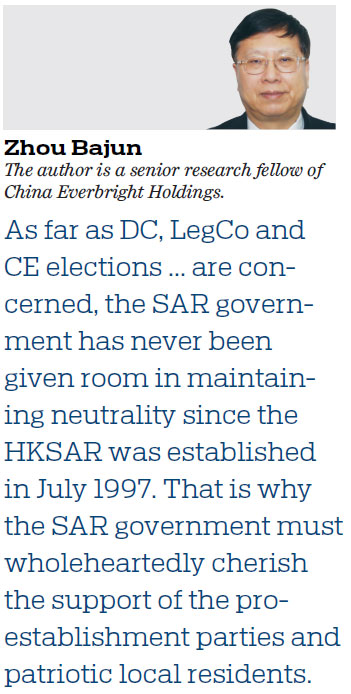No 'middle path' for candidates in upholding Basic Law
Updated: 2019-11-06 06:00
(HK Edition)
|
|||||||
Preparations for the Sixth District Council elections of the Hong Kong Special Administrative Region are well underway.
Many residents are deeply concerned after multiple nominees well-known for their pro-independence activism and still thoroughly involved in the "Liberate Hong Kong, Revolution of Our Times" campaign qualified to run in the upcoming elections. But, Joshua Wong Chi-fung, founder and secretary-general of radical student group Demosisto and one of the most prominent voices of Hong Kong independence as an option in "self-determination", is the only nominee who was disqualified as an election candidate by a returning officer who replaced her colleague on sick leave.
It's fair to say the vetting process and its outcome have left many people wondering how flexible the political and constitutional criteria could be when returning officers appointed by the Electoral Affairs Commission determine if a nominee is honest about unconditionally upholding the Basic Law.

As soon as the names of the DC election candidates were published, the returning officers were greeted with a wave of disbelief and frustration from patriotic local residents who are, obviously, worried about their well-being, as well as the future of Hong Kong society as a whole, if separatists were to win seats in the city's district councils. There's no doubt those supporters of Hong Kong independence, if not sworn separatists already, would use their power to advance the unconstitutional and illegal agenda of the masterminds behind the ongoing "black revolution" in Hong Kong. Furthermore, the next Legislative Council elections are slated to be held next summer, when the most devout and influential advocates of Hong Kong independence, by all means necessary, will come out fighting tooth and nail for their candidacy. Can anyone trust the returning officers in preventing a separatist from running for a seat in the legislature? Or should we give up on the returning officers and, instead, expect the central government to exercise its constitutional power of refusing to appoint any of them in case they won?
So far, none of the returning officers, who approved the candidacies of the pro-independence nominees, has responded to inquiries by patriotic voters. Many people now fear that in the upcoming DC elections, the separatists and their foreign masters would win. If that scenario materializes, the 2020 LegCo election would very likely see separatist politicians and their foreign masters win. The worst case scenario is, of course, the central government would have no choice but to refuse to appoint any of the separatists who wins in next year's legislative polls, followed by a constitutional crisis when a pro-independence CE-elect is denied approval by Beijing.
Some people suggest that the SAR government should remain neutral in the DC, LegCo and CE elections because the CE is not a member of any political party and the executive wing of the SAR government is not jointly formed by political groups.
Indeed, the HKSAR has retained the apolitical tradition of bureaucracy under British rule. However, that does not mean the HKSAR Government has no political standing of its own. Article 104 of the Basic Law of the HKSAR stipulates: "When assuming office, the Chief Executive, principal officials, members of the Executive Council and of the Legislative Council, judges of the courts at all levels and other members of the judiciary in the Hong Kong Special Administrative Region must, in accordance with the law, swear to uphold the Basic Law of the Hong Kong Special Administrative Region of the People's Republic of China and swear allegiance to the Hong Kong Special Administrative Region of the People's Republic of China." An interpretation of Article 104 of the Basic Law of the HKSAR of the People's Republic of China by the Standing Committee of the National People's Congress is available in Instrument 25 of the Basic Law. Although that article does not mention the DC, the District Council Ordinance of the HKSAR contains the same requirements for district councilors-elect upon taking office.
Incumbent CE Carrie Lam Cheng Yuet-ngor was nominated and overwhelmingly supported by pro-establishment members of the Fifth CE Election Committee of the HKSAR to win the CE Election in March 2017. None of the opposition members of the CEEC nominated her and only a few voted for her, by anonymous ballot. In the Fifth-term HKSAR Government, only a tiny percentage of department chiefs, deputy chiefs and their assistants have had opposition party affiliation. In LegCo, the SAR government has always relied on pro-establishment lawmakers to win legislative approval for the policies and laws it proposed because the opposition camp has consistently tried its utmost to obstruct, if not derail, the SAR government's law-based governance.
As far as DC, LegCo and CE elections, including the selection of CEEC members, are concerned, the SAR government has never been given room in maintaining neutrality since the HKSAR was established in July 1997. That is why the SAR government must wholeheartedly cherish the support of the pro-establishment parties and patriotic local residents.
The incumbent SAR government's term in office will end on June 30, 2022. If the opposition camp wins a majority of seats in the upcoming DC and LegCo elections, it will be extremely difficult, if not impossible, for the SAR government to maintain effective administration in accordance with the law, unless those opposition lawmakers-elect give the CE and the Department of Justice a sound reason to file for their disqualification with the High Court.
(HK Edition 11/06/2019 page9)